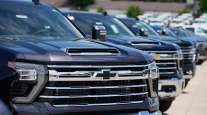Higher Fuel Costs Lower 1Q Earnings, But Many Fleets Top Year-Ago Results
This story appears in the April 25 print edition of Transport Topics.
Sharply higher fuel prices put a significant dent in first-quarter earnings for truckload fleets, but seven of the eight companies that have reported thus far still managed to top year-earlier results.
Earnings slipped 20% to $9.9 million at Knight Transportation Inc., with fuel accounting for most of the decline as fuel costs nearly matched spending on wages and benefits.
Two other fleets — Marten Transport and USA Truck Inc. — said fuel costs exceeded what they paid in wages and benefits. Marten eked out a 5% rise in net income to $4.1 million, while USA Truck narrowed its loss to $2.7 million.
Fleets with a lower percentage of fuel costs relative to revenue showed higher earnings growth, led by net income that more than doubled to $7.9 million at Forward Air. Werner Enterprises’ profit increased 50% to $16.3 million, and J.B. Hunt Transport Services Inc. boosted earnings 34% to $50.1 million, as its intermodal business that limits over-the-road costs generated 70% of profits.
Similarly, Heartland Express Inc. posted 25% higher earnings, at $14.9 million, and Landstar System Inc.’s net income climbed 20% to $20.6 million.
“Fuel surcharges typically lag market prices by a week, which means this week’s fuel-surcharge revenue is based on last week’s lower price, while we are actually paying this week’s higher price at the pump,” said Cliff Beckham, CEO of USA Truck, where fuel costs accounted for the majority of its 26-cents-a-share loss.
The effect of that lag was illustrated by increases of as much as 10.1 cents a gallon in the U.S. average retail diesel price from week-to-week during the first three months of 2011. On average, fuel costs rose about 30% year-over-year during the first quarter and haven’t shown signs of relenting during April.
“In periods of significantly rising fuel prices, typical fuel surcharge programs are inadequate,” said Kevin Knight, CEO of Knight Transportation.
Fuel cost increases shaved 2 cents a share off earnings at Knight, where diesel expense of $49.7 million almost equaled $50.9 million for salaries, wages and benefits. Diesel consumed 27% of Knight’s first-quarter revenue of $186.5 million.
Fuel surcharge costs also don’t usually cover empty miles, idle time and out-of-route-miles driven, Knight added.
Fuel costs equaled 26% of Marten’s revenue and 28% at USA Truck. Hunt fared better, even though its fuel expense rose 35% to $109 million. That total was just 11% of revenue, reflecting its intermodal bent.
Among the eight carriers, revenue growth was relatively steady, averaging nearly 12%. Hunt’s 19% revenue rise to $1 billion was the most, and Landstar’s 4% gain to $572 million trailed the group.
USA Truck revenue rose 15% to $124 million; Knight rose 13% to $186.5 million; Forward Air climbed 12% to $120.2 million; and Werner, Heartland and Marten all were clustered at 10% increases with revenue of $469.4 million, $127.7 million and $137.9 million, respectively.
Market commentary from Heartland summed up a view also expressed in other carriers’ reports.
“The demand for freight services improved throughout the quarter,” Heartland said in a statement. “However, operating results were hindered by a combination of tight driver availability, escalating fuel prices and an unusually harsh winter in certain operating regions.”
Knight said in an April 19 statement: “The first quarter of 2011 was negatively affected by several factors. Most notably was the dramatic increase for the cost of diesel fuel. In addition, softer than typical freight demand in the West, and severe weather across the country created significant challenges.”
Another common theme in first-quarter earnings reports was the expectation of an improved market and profit in the second quarter because of economic growth, tighter capacity and rate increases.
“We believe freight and capacity dynamics in the marketplace are favorable for additional pricing gains in the second quarter,” Werner said in an April 20 statement, noting a gain of 4.5% in revenue cents per total mile.
Among the carriers that envisioned better second-quarter results were Knight, USA Truck, Forward Air and Landstar. Other companies didn’t offer an outlook.
Werner and Heartland’s profits were helped by gains on disposal of their newer-model used trucks. Werner’s gain rose to $4.8 million from $1.1 million a year earlier, and Heartland’s climbed to $3.9 million from $507,000.
“Smartly disposing of equipment (whether by trade or outright sale) is a core competency, if one wants to be a trucker, and not all carriers are competent at this,” BB&T Capital Markets analyst Thom Albrecht said in an April 21 report.




